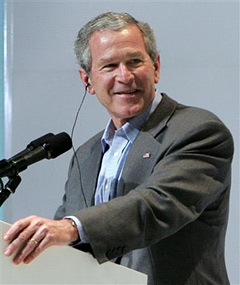 |
 |
 |
 News Around the Republic of Mexico | April 2006 News Around the Republic of Mexico | April 2006  
Although Summit's Tone is Good, U.S.-Mexico Relationship Could Wane
 George E. Condon Jr. & S. Lynne Walker - Copley News George E. Condon Jr. & S. Lynne Walker - Copley News


| | U.S. President George W. Bush reacts during a joint news conference with Mexican President Vicente Fox and Canadian Prime Minister Stephen Harper in Cancun, Mexico March 31, 2006. Bush is taking time to explain himself, open up to the public in new ways and court the U.S. Congress as he tries to breathe life into a presidency beset by sagging ratings and influence. (Chris Wattie/Reuters) |
Cancun, Mexico – Experts say that while the U.S.-Mexico relationship has matured during the administration of President Vicente Fox, they fear it could deteriorate under the next president, who will be elected this year.

Luis Rubio, an analyst at a Mexico City think tank, said the tone at last week's summit of Fox, President Bush and Canadian Prime Minister Stephen Harper in Cancun mattered.

“My sense is that it was a very amicable meeting without any substance. But the fact that it was amicable is relevant,” Rubio said, stating that Bush's message was “that the way to work is to work together.”

Rubio said Bush's and Fox's concerns about the bilateral relationship “have nothing to do with the present administration. They have to do with the new administration that will take over in December.”

Mexico elects a new president July 2; Fox cannot run for re-election.

Mexicans greeted Bush's 2000 election with high hopes that the former Texas governor would bring about the enactment of a comprehensive immigration bill.

But those hopes were dashed on Sept. 11, 2001, when the terrorist strikes moved Bush to see U.S.-Mexican issues through a security prism.

Although Fox pursued a close relationship with Washington, his opposition to the Iraq war badly frayed his ties with Bush. The ties were further damaged when Fox spurned an invitation to Bush's Texas ranch to protest Texas' execution of a Mexican national.

Fox also has learned that Bush's power is limited. “Fox is getting the word that it's going to be Congress that calls the shots on immigration and that Bush can't push the Congress,” said George Grayson of the College of William and Mary.

Experts indicated Fox and Bush wanted to use the Cancun summit to send a strong message to the leading candidate to succeed Fox – Andrés Manuel López Obrador of the leftist Democratic Revolution Party. That message is not to go back to the days of knee-jerk attacks on Washington.

Grayson said Fox has been “taking the high road. But if López Obrador is elected, I suspect that we are going to see some old-fashioned mudslinging.”

Jorge Castañeda, Fox's first foreign minister, said López Obrador is saying “that Fox has been a U.S. stooge, a toady, that he has constantly caved to the U.S., all of which is false because on the single most important issue – which is Iraq – we didn't.” | 
 | |
 |



